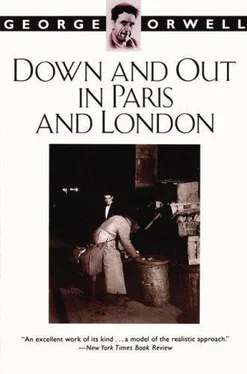George Orwell - Down and Out in Paris and London
Здесь есть возможность читать онлайн «George Orwell - Down and Out in Paris and London» весь текст электронной книги совершенно бесплатно (целиком полную версию без сокращений). В некоторых случаях можно слушать аудио, скачать через торрент в формате fb2 и присутствует краткое содержание. Жанр: Старинная литература, на русском языке. Описание произведения, (предисловие) а так же отзывы посетителей доступны на портале библиотеки ЛибКат.
- Название:Down and Out in Paris and London
- Автор:
- Жанр:
- Год:неизвестен
- ISBN:нет данных
- Рейтинг книги:5 / 5. Голосов: 1
-
Избранное:Добавить в избранное
- Отзывы:
-
Ваша оценка:
- 100
- 1
- 2
- 3
- 4
- 5
Down and Out in Paris and London: краткое содержание, описание и аннотация
Предлагаем к чтению аннотацию, описание, краткое содержание или предисловие (зависит от того, что написал сам автор книги «Down and Out in Paris and London»). Если вы не нашли необходимую информацию о книге — напишите в комментариях, мы постараемся отыскать её.
Down and Out in Paris and London — читать онлайн бесплатно полную книгу (весь текст) целиком
Ниже представлен текст книги, разбитый по страницам. Система сохранения места последней прочитанной страницы, позволяет с удобством читать онлайн бесплатно книгу «Down and Out in Paris and London», без необходимости каждый раз заново искать на чём Вы остановились. Поставьте закладку, и сможете в любой момент перейти на страницу, на которой закончили чтение.
Интервал:
Закладка:
time when I was with him there had been a case of
"immoral conduct" in Hyde Park, in which the police had
behaved rather badly. Bozo produced a cartoon of Hyde
Park with policemen concealed in the trees, and the
legend, "Puzzle, find the policemen." I pointed out to him
how much more telling it would be to put, "Puzzle, find
the immoral conduct," but Bozo would not hear of it. He
said that any policeman who saw it would move him on,
and he would lose his pitch for good.
Below screevers come the people who sing hymns, or
sell matches, or bootlaces, or envelopes containing a few
grains of lavender-called, euphemistically, perfume. All
these people are frankly beggars, exploiting an appearance
of misery, and none of them takes on an average more
than half a crown a day. The reason why they have to
pretend to sell matches and so forth instead of begging
outright is that this is demanded by the absurd English
laws about begging. As the law now stands, if you
approach a stranger and ask him for twopence, he can call
a policeman and get you seven days for begging. But if
you make the air hideous by droning "Nearer, my God, to
Thee," or scrawl some chalk daubs on the pavement, or
stand about with a tray of matches-in short, if you make a
nuisance of yourself-you are held to be following a
legitimate trade and not begging. Match-selling and street-
singing are simply legalised crimes. Not profitable crimes,
however; there is not a singer or match-seller in London
who can be sure of £5o a year-a poor return for standing
eighty-four hours a week on the kerb, with the cars
grazing your backside.
It is worth saying something about the social position
of beggars, for when one has consorted with them, and
found that they are ordinary human beings, one cannot
help being struck by the curious attitude that society
takes towards them. People seem to feel that there is
some essential difference between beggars and ordinary
"working" men. They are a race apart, outcasts, like
criminals and prostitutes. Working men "work," beggars
do not "work"; they are parasites, worthless in their very
nature. It is taken for granted that a beggar does not
"earn" his living, as a bricklayer or a literary critic
"earns" his. He is a mere social excrescence, tolerated
because we live in a humane age, but essentially
despicable.
Yet if one looks closely one sees that there is no
essential
difference between a beggar's livelihood and that
of numberless respectable people. Beggars do not work, it
is said; but, then, what is
work ? A navvy works by
swinging a pick. An accountant works by adding up
figures. A beggar works by standing out of doors in all
weathers and getting varicose veins, chronic bronchitis,
etc. It is a trade like any other; quite useless, of course -
but, then, many reputable trades are quite useless. And as
a social type a beggar compares well with scores of others.
He is honest compared with the sellers of most patent
medicines, high-minded compared with a Sunday
newspaper proprietor, amiable compared with a hire-
purchase tout-in short, a parasite, but a fairly harmless
parasite. He seldom extracts more than a bare living from
the community, and, what should justify him according to
our ethical ideas, he pays for it over and over in suffering.
I do not think there is anything about a beggar that sets
him in a different class from other people, or gives most
modern men the right to despise him.
Then the question arises, Why are beggars despised? -
for they are despised, universally. I believe it is for the
simple reason that they fail to earn a decent living. In
practice nobody cares whether work is useful or useless,
productive or parasitic; the sole thing demanded is that it
shall be profitable. In all the modern talk about energy,
efficiency, social service and the rest of it, what meaning
is there except "Get money, get it legally, and get a lot of
it"? Money has become the grand test of virtue. By this
test beggars fail, and for this they are despised. If one
could earn even ten pounds a week at begging, it would
become a respectable profession immediately. A beggar,
looked at realistically, is simply a business man, getting
his living, like other business men, in the way that comes
to hand. He has not, more than most modern people, sold
his honour; he has merely made the mistake of choosing
a trade at which it is impossible to grow rich.
XXXII
I WANT to put in some notes, as short as possible, on
London slang and swearing. These (omitting the ones
that everyone knows) are some of the cant words now
used in London:
A gagger-beggar or street performer of any kind. A
moocher-one who begs outright, without pretence of
doing a trade. A nobbler-one who collects pennies for a
beggar. A chanter-a street singer. A clodhopper -a street
dancer. A mugfaker-a street photographer. A glimmer-
one who watches vacant motor-cars. A gee (or jee-it is
pronounced jee)-the accomplice of a cheapjack, who
stimulates trade by pretending to buy
something. A split-a detective. A flattie-a policeman. A
dideki-a gypsy. A toby-a tramp.
A drop-money given to a beggar. Funkumlavender or
other perfume sold in envelopes. A boozer -a public-
house. A slang-a hawker's licence. A kip -a place to
sleep in, or a night's lodging. SmokeLondon. A judy-a
woman. The spike-the casual ward. The lump-the casual
ward. A tosheroon-a half-crown. A denner-a shilling. A
hog-a shilling. A sprowsie-a sixpence. Clods-coppers. A
drum-a billy can. Shackles-soup. A chat-a louse. Hard-
up-tobacco made from cigarette ends. A stick or cane -a
burglar's jemmy. A peter-a safe. A bly-a burglar's oxy-
acetylene blow-lamp
To bawl-to suck or swallow. To knock off-to steal. To
skipper-to sleep in the open.
About half of these words are in the larger diction-
aries. It is interesting to guess at the derivation of some
of them, though one or two-for instance, "funkum" and
"tosheroon"-are beyond guessing. "Deaner" presumably
comes from "denier." "Glimmer" (with the verb "to
glim") may have something to do with the old word
"glim," meaning a light, or another old word "glim,"
meaning a glimpse; but it is an instance of the formation
of new words, for in its present sense it can hardly be
older than motor-cars. "Gee" is a curious word;
conceivably it has arisen out of "gee," meaning horse, in
the sense of stalking horse. The derivation of "screever"
is mysterious. It must come ultimately from scribo, but
there has been no similar word in English for the past
hundred and fifty years; nor can it have come directly
from the French, for pavement artists are unknown in
France. "Judy" and "bawl" are East End words, not
found west of Tower Bridge. "Smoke" is a word used
only by tramps. "Kip" is Danish. Till quite recently
the word "doss" was used in this sense, but it is now
quite obsolete.
London slang and dialect seem to change very
rapidly. The old London accent described by Dickens
and Surtees, with v for w and w for v and so forth, has
now vanished utterly. The Cockney accent as we know
it seems to have come up in the 'forties (it is first men-
tioned in an American book, Herman Melville's
White
Читать дальшеИнтервал:
Закладка:
Похожие книги на «Down and Out in Paris and London»
Представляем Вашему вниманию похожие книги на «Down and Out in Paris and London» списком для выбора. Мы отобрали схожую по названию и смыслу литературу в надежде предоставить читателям больше вариантов отыскать новые, интересные, ещё непрочитанные произведения.
Обсуждение, отзывы о книге «Down and Out in Paris and London» и просто собственные мнения читателей. Оставьте ваши комментарии, напишите, что Вы думаете о произведении, его смысле или главных героях. Укажите что конкретно понравилось, а что нет, и почему Вы так считаете.












